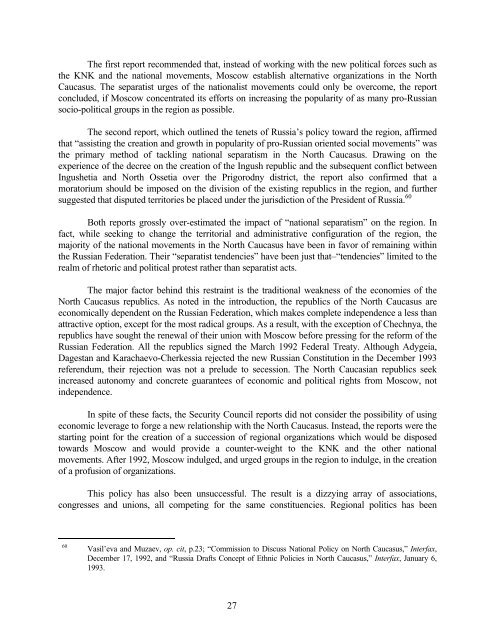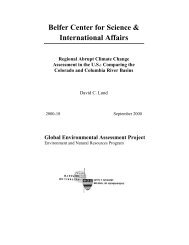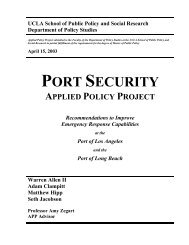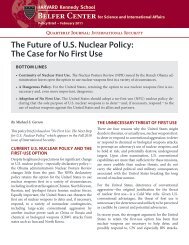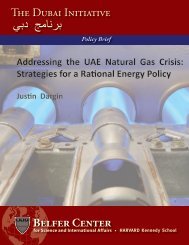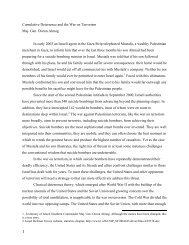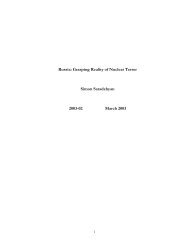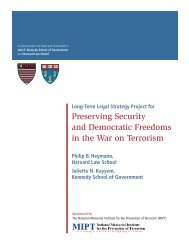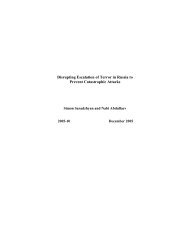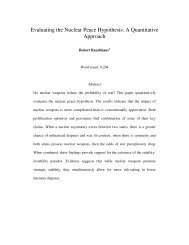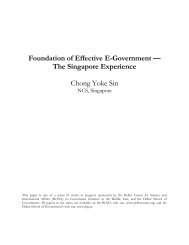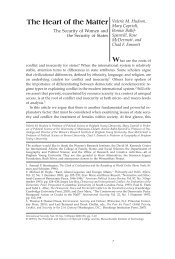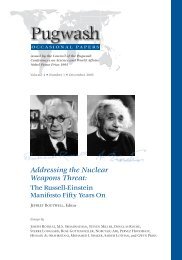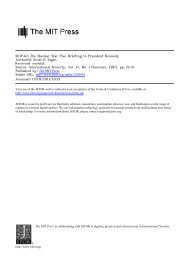RUSSIA'S TINDERBOX - Belfer Center for Science and International ...
RUSSIA'S TINDERBOX - Belfer Center for Science and International ...
RUSSIA'S TINDERBOX - Belfer Center for Science and International ...
You also want an ePaper? Increase the reach of your titles
YUMPU automatically turns print PDFs into web optimized ePapers that Google loves.
The first report recommended that, instead of working with the new political <strong>for</strong>ces such as<br />
the KNK <strong>and</strong> the national movements, Moscow establish alternative organizations in the North<br />
Caucasus. The separatist urges of the nationalist movements could only be overcome, the report<br />
concluded, if Moscow concentrated its ef<strong>for</strong>ts on increasing the popularity of as many pro-Russian<br />
socio-political groups in the region as possible.<br />
The second report, which outlined the tenets of Russia’s policy toward the region, affirmed<br />
that “assisting the creation <strong>and</strong> growth in popularity of pro-Russian oriented social movements” was<br />
the primary method of tackling national separatism in the North Caucasus. Drawing on the<br />
experience of the decree on the creation of the Ingush republic <strong>and</strong> the subsequent conflict between<br />
Ingushetia <strong>and</strong> North Ossetia over the Prigorodny district, the report also confirmed that a<br />
moratorium should be imposed on the division of the existing republics in the region, <strong>and</strong> further<br />
suggested that disputed territories be placed under the jurisdiction of the President of Russia. 60<br />
Both reports grossly over-estimated the impact of “national separatism” on the region. In<br />
fact, while seeking to change the territorial <strong>and</strong> administrative configuration of the region, the<br />
majority of the national movements in the North Caucasus have been in favor of remaining within<br />
the Russian Federation. Their “separatist tendencies” have been just that–“tendencies” limited to the<br />
realm of rhetoric <strong>and</strong> political protest rather than separatist acts.<br />
The major factor behind this restraint is the traditional weakness of the economies of the<br />
North Caucasus republics. As noted in the introduction, the republics of the North Caucasus are<br />
economically dependent on the Russian Federation, which makes complete independence a less than<br />
attractive option, except <strong>for</strong> the most radical groups. As a result, with the exception of Chechnya, the<br />
republics have sought the renewal of their union with Moscow be<strong>for</strong>e pressing <strong>for</strong> the re<strong>for</strong>m of the<br />
Russian Federation. All the republics signed the March 1992 Federal Treaty. Although Adygeia,<br />
Dagestan <strong>and</strong> Karachaevo-Cherkessia rejected the new Russian Constitution in the December 1993<br />
referendum, their rejection was not a prelude to secession. The North Caucasian republics seek<br />
increased autonomy <strong>and</strong> concrete guarantees of economic <strong>and</strong> political rights from Moscow, not<br />
independence.<br />
In spite of these facts, the Security Council reports did not consider the possibility of using<br />
economic leverage to <strong>for</strong>ge a new relationship with the North Caucasus. Instead, the reports were the<br />
starting point <strong>for</strong> the creation of a succession of regional organizations which would be disposed<br />
towards Moscow <strong>and</strong> would provide a counter-weight to the KNK <strong>and</strong> the other national<br />
movements. After 1992, Moscow indulged, <strong>and</strong> urged groups in the region to indulge, in the creation<br />
of a profusion of organizations.<br />
This policy has also been unsuccessful. The result is a dizzying array of associations,<br />
congresses <strong>and</strong> unions, all competing <strong>for</strong> the same constituencies. Regional politics has been<br />
60 Vasil’eva <strong>and</strong> Muzaev, op. cit, p.23; “Commission to Discuss National Policy on North Caucasus,” Interfax,<br />
December 17, 1992, <strong>and</strong> “Russia Drafts Concept of Ethnic Policies in North Caucasus,” Interfax, January 6,<br />
1993.<br />
27


